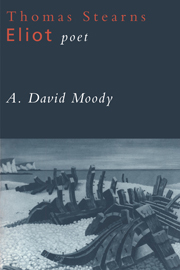Book contents
- Frontmatter
- Contents
- Acknowledgments
- Preface to second edition
- Introduction
- 1 The growth of the poet's mind
- PART ONE 1905–1912 – AN INDIVIDUAL TALENT
- Oxford University Extension Lectures
- PART TWO 1912–1922 – ‘SHALL I AT LEAST SET MY LANDS IN ORDER?’
- 3 Gerontion, and the historical sense
- 4 Tiresias transformed
- PART THREE 1922–1930 – ‘ORDINA QUEST’ AMORE, O TU CHE M' AMI'
- PART FOUR 1931–1939 – THE WORD IN THE DESERT
- PART FIVE 1939–1945 – APOCALYPSE
- AFTERWORDS
- APPENDICES
- Notes
- Index
3 - Gerontion, and the historical sense
Published online by Cambridge University Press: 05 February 2012
- Frontmatter
- Contents
- Acknowledgments
- Preface to second edition
- Introduction
- 1 The growth of the poet's mind
- PART ONE 1905–1912 – AN INDIVIDUAL TALENT
- Oxford University Extension Lectures
- PART TWO 1912–1922 – ‘SHALL I AT LEAST SET MY LANDS IN ORDER?’
- 3 Gerontion, and the historical sense
- 4 Tiresias transformed
- PART THREE 1922–1930 – ‘ORDINA QUEST’ AMORE, O TU CHE M' AMI'
- PART FOUR 1931–1939 – THE WORD IN THE DESERT
- PART FIVE 1939–1945 – APOCALYPSE
- AFTERWORDS
- APPENDICES
- Notes
- Index
Summary
Those who do not remember the past are condemned to relive it.
(Santayana)Do not let me hear
Of the wisdom of old men…
Eliot thought of ‘Gerontion’ as a possible prelude to The Waste Land; and certainly this persona of 1919, the successor to Prufrock, is nearly related to Tiresias, his successor. Since the poetry of the period 1916 to 1921 is predominantly a study in the state of mind of which Tiresias is the most important representative it may be useful to bring him to mind at once.
Tiresias has a considerable history, of which this is only a brief abstract. In Homer he is the prophet ‘who even dead hath yet his mind entire’ – the phrase is from Pound's Cantos – whom Odysseus summons from Hades to tell whether he will reach Ithaca. In Sophocles, as the blind, withered prophet of Thebes, he is the seer of the sins of Oedipus, and of Creon, for which the city is cursed. Ovid tells how he became expert in the pleasures of both sexes, and was struck blind, and gifted with prophecy which no-one would heed. Dante placed him in Hell with the augurs and diviners, who because they wish to peer into the secret future have their faces turned so that they can only look back.
- Type
- Chapter
- Information
- Thomas Stearns Eliot: Poet , pp. 53 - 78Publisher: Cambridge University PressPrint publication year: 1995



